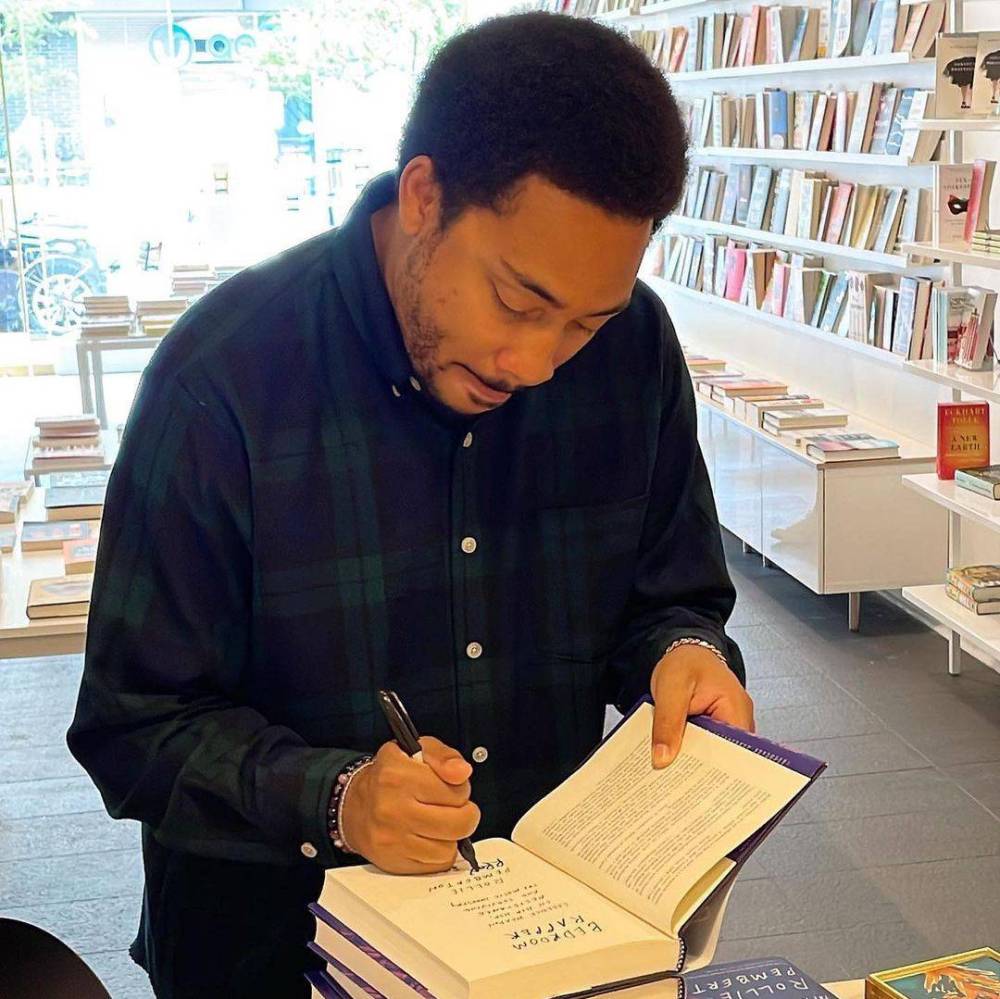Image via Cadence Weapon/Instagram
Since his official 2005 debut, Breaking Kayfabe, Cadence Weapon’s music and writing have consistently served a higher purpose. He’s actively intentional with his language, never feeling the need to squeeze too many words into a bar and has never sacrificed his message for the sake of an intricate rhyme scheme. He doesn’t rap just to rap and never has compromised to fit in. After all, being a rapper in Canada in the early 2000’s was not yet a properly respected expression in the eyes of a judgmental mainstream. While the rest of the country was fixated on indie dance and rock bands, Weapon mixed his fascination for electronic music and his love for language into an expression that was all his own – even if not immediately understood or embraced by fellow Edmontonians.
While the multi-hyphenate born Rollie Pemberton was growing up in Edmonton, there was no real hip-hop scene in the city, and no regional Canadian formula to follow when pursuing his dream of becoming a rapper. Almost a decade later, he’s now widely considered among the second-wave pioneers of Canadian hip-hop. And last year, he published his first non-fiction book about his experiences in the music industry, Bedroom Rapper. “I’m at a point in my career where I’m in a position, in Canada at least, where I feel like I can lead other artists and I feel like I can take chances that other people can’t take and I wanna do that for people. I wanna lead people,” he explains.
After being inspired by his father, Teddy Pemberton, a prominent DJ in Edmonton, the future Cadence Weapon started rapping at 13. Growing up around an eclectic mix of genres and artists, the younger Pemberton quickly gained an appreciation, love and curiosity for diverse, underground music. “We grew up listening to everything, so I never saw a reason why there should be any separation between the things,” Pemberton says.
By 15, he was already guesting on his father’s station. After briefly attending journalism school in Virginia, he decided to drop out to pursue his music career. Before he turned 20, he had already made a name for himself as a knowledgeable and tough critic, regularly writing reviews for Pitchfork. He also began making beats on his laptop in his mom’s attic with pirated software and the cheapest gear he could find.
The feeling of being an outsider was nothing new – especially in Edmonton, where few at the time listened to obscure internet-centric underground rap and electronic music. In the same way that his father did with vinyl, Pemberton started digging through music blogs for sonic inspiration. Before long, he found a sense of community within early 2000s music-sharing chat rooms – something he had never found in the Prairies.
Once he seriously focused on his own music, he realized that the ultra-critical reviews he’d been writing would not have been appreciated if they were to have been written about his own music. “What ended up happening was I was an extremely hyper-critical reviewer, but I actually could not take any criticism myself for my own music. I had very thin skin when I was younger about that kind of thing,” Pemberton explains.
A review of one of his earlier albums offended him when he was branded a “bedroom rapper.”
“The interesting thing about it is in the moment, I didn’t think that was a positive; being able to totally make my career just off of a computer at my mom’s house as a child and just through pure ingenuity and using the internet. I didn’t think that was a plus at the time,” he wrote.
Reflection, maturity and the writing of his book caused him to change his perspective. “That’s the thing about this book, it’s like hindsight’s 20/20 and looking back, it’s like, oh actually, I was a pioneer for young musicians tryna make albums with their computer,” he continued.
At the time, he wasn’t yet aware of the significance of what he was doing and making. Essentially, he laid down the blueprint for other Canadian music nerds and lovers to follow his lead in becoming artists, regardless of the resources and support around them.
The Canadian music scene (more specifically its hip-hop scene) is one that has historically been behind the times in relation to the diversity and influence of the neighboring American world. Long before Drake broke through, Pemberton was paving the way for the next generation, alongside other underground acts like Shad and Buck 65.
His aforementioned debut, Breaking Kayfabe was met with largely positive reviews upon its release in 2005 and kickstarted his career as a household name in Canadian music. It went on to be nominated for the inaugural Canadian Polaris Music Prize the following year.
In 2009, Rollie was named Edmonton’s newest poet laureate, replacing E.D. Blodgett, a 74-year-old white professor who had published 19 collections of poetry. The decision to appoint him as the city’s new cultural ambassador was a testament to his growth and commitment to repping his city.
From the video game-inspired production on Breaking Kayfabe to the house-inspired reflections and tales of Afterparty Babies to the political commentary over an array of upbeat production inspired by genres all over the world on the Polaris Prize-winning Parallel World, Pemberton has never been predictable.
Throughout his book’s entire 11th chapter, Pemberton writes openly about his experiences being exploited by record labels. Experiences like that are precisely why Pemberton made the writing of Bedroom Rapper a reality. “Maybe some young artists will be able to avoid going through a situation like I went through because they read this. Nothing would make me happier than if that turns out to be true.” – Isaac Fontes
(This interview has been condensed and lightly edited for clarity.)

